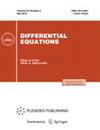奇异扰动优化跟踪问题
IF 0.8
4区 数学
Q2 MATHEMATICS
引用次数: 0
摘要
摘要 我们考虑了在存在外生扰动的状态向量信息不完整的情况下,一个具有给定参考路径的奇异扰动最优跟踪问题。为了分析求解该问题时产生的微分方程,我们使用了基于快慢运动积分流形技术的分解方法。本文章由计算机程序翻译,如有差异,请以英文原文为准。
Singularly Perturbed Optimal Tracking Problem
Abstract
We consider a singularly perturbed optimal tracking problem with a given reference path in the case of incomplete information about the state vector in the presence of exogenous disturbances. To analyze the differential equations that arise when solving this problem, we use the decomposition method, which is based on the technique of integral manifolds of fast and slow motions.
求助全文
通过发布文献求助,成功后即可免费获取论文全文。
去求助
来源期刊

Differential Equations
数学-数学
CiteScore
1.30
自引率
33.30%
发文量
72
审稿时长
3-8 weeks
期刊介绍:
Differential Equations is a journal devoted to differential equations and the associated integral equations. The journal publishes original articles by authors from all countries and accepts manuscripts in English and Russian. The topics of the journal cover ordinary differential equations, partial differential equations, spectral theory of differential operators, integral and integral–differential equations, difference equations and their applications in control theory, mathematical modeling, shell theory, informatics, and oscillation theory. The journal is published in collaboration with the Department of Mathematics and the Division of Nanotechnologies and Information Technologies of the Russian Academy of Sciences and the Institute of Mathematics of the National Academy of Sciences of Belarus.
 求助内容:
求助内容: 应助结果提醒方式:
应助结果提醒方式:


